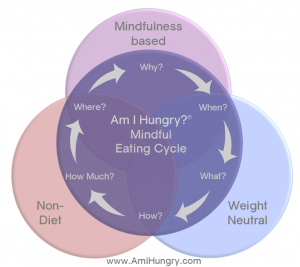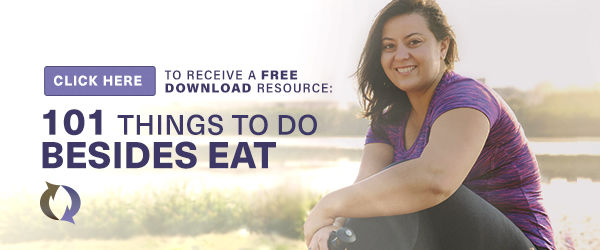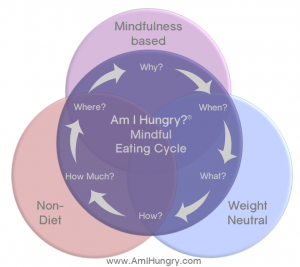Before I answer the question, “What is the difference between Am I Hungry? and intuitive eating?”, let me say although I can’t speak for the others, I believe there are more similarities than differences between these approaches.
Most important, we are all doing the essential work of “cracking the cultural veneer” as Am I Hungry? Licensee Julie Goyette MS RDN said.
Am I Hungry? and Intuitive Eating are champions of the same cause
You may already be aware that there’s an incredible shift happening in the way many health and wellness professionals approach nutrition, physical activity, and self-care. This grassroots “anti-diet” or “non-diet” movement has emerged from the growing awareness that decades of dieting have seriously disrupted our instinctive relationship with food and our bodies.
This movement is not new but the internet has made it possible for it to flourish in recent years. Many individuals who previously felt alone in their confusion and frustration now realize that their experiences with dieting are the norm, not the exception.
Many health professionals who independently came to the same conclusion that diets don’t work for long-term change now have a voice and a tribe.
Am I Hungry? and Intuitive Eating are “weight-neutral”
I’ve written a lot about how Am I Hungry? Mindful Eating Programs and Training made the shift to a weight-neutral and weight-inclusive approach nearly a decade ago. As the research about the lack of efficacy and the potential harms of promoting weight loss have mounted, we have joined with the growing Health at Every Size® movement and taken an active stance in this regard.
However, be aware that many people promote mindful eating for weight loss or weight management. (Read Mindful Eating and Weight Loss: Setting the record straight.)
We agree with the TCME (The Center for Mindful Eating) Position on Mindful Eating and Weight Concerns; in part, “Based on scientific research, TCME expresses caution and concern about engaging in mindful eating exercises for weight loss.”
Similarly, although the “original Intuitive Eating pros” (as they call themselves) have also moved to a weight-neutral approach, there are many people “out there” who promote “intuitive eating” for weight loss.
www.the wild, wild web of confusion, half-truths, and lies
There has been an explosion of bloggers dolling out suspect health, nutrition and fitness advice, social media feeds full of fitspo and thigh gap images, targeted internet ads promoting weight loss scams, and a culture steeped in the myth that thinness equals health, beauty, and happiness.
Some individuals and organizations have co-opted mindful eating, intuitive eating, and the body positive movements to promote their diets, rigid food rules, and weight loss programs, whether from a fundamental misunderstanding of these concepts or a recognition of the threat they pose to the billions of dollars generated from the pursuit of thinness. (Let’s call them wolves in sheep’s clothing.)
The anti-diet movement is still relatively small compared to the forces that tell us we cannot trust ourselves to manage our own eating. The anti-diet movement needs to grow quickly and effectively or the next generation of yo-yo dieting, disordered eating, orthorexia, and shame-based decision-making is likely to engulf more lives than ever before.
That’s why I don’t think of my colleagues who are doing similar work as competitors, but as champions of the same cause.
But that begs the question: what is the difference between Am I Hungry? and Intuitive Eating
Am I Hungry? offers non-diet, weight-neutral, mindfulness-based programs and training that overlap with the published principles of Intuitive Eating, Mindful Eating, and Health at Every Size.
 I’ll come back to our “non-diet, weight-neutral, mindfulness-based” principles in a moment, but it’s not really about how Am I Hungry? is different but about what we bring to the non-diet table: The Mindful Eating Cycle.
I’ll come back to our “non-diet, weight-neutral, mindfulness-based” principles in a moment, but it’s not really about how Am I Hungry? is different but about what we bring to the non-diet table: The Mindful Eating Cycle.
- The Mindful Eating Cycle is built on the mindfulness principles of awareness, non-judgment, curiosity, and acceptance.
- The Mindful Eating Cycle provides the structure for recognizing patterns in our beliefs, thoughts, feelings, and behaviors as they relate to food, physical activity, body image, and self-care.
- The Mindful Eating Cycle enables wellness professionals and individuals to recognize and resolve problematic eating behaviors by focusing on the root causes.
- Using the foundation of the Mindful Eating Cycle as a guide, participants learn specific processes to systematically replace their ineffective patterns with new beliefs, thoughts, feelings, and behaviors that support the vibrant life they crave.
- The Mindful Eating Cycle progressively builds awareness of why, when, what, how, and how much you eat, and where you invest your energy.
- The Mindful Eating Cycle provides a practical decision-making framework that is simple to learn and internalize.
- The Mindful Eating Cycle can be easily applied to myriad populations and conditions (diabetes self-management, binge eating disorder and emotional eating, those struggling after bariatric surgery, students, athletes, families)
- The Mindful Eating Cycle is easily adapted to learning in different formats including workshops and webinars, coaching and clinical encounters, retreats, therapy, campuses, and organizational wellness.
Am I Hungry? Mindful Eating Principles
While I was not consciously aware of intuitive eating or mindful eating when I began this work in 1999, somehow this journey brought Am I Hungry? to a similar place. Now we describe our programs and mindful eating trainings as non-diet, mindfulness-based, and weight-neutral.
Non-diet
Whether you call it intuitive eating, mindful eating, or the non-diet approach, Am I Hungry? utilizes a non-restrictive methodology that promotes the fearless enjoyment of all food without restriction, deprivation, or guilt. As people heal their relationship with food, they begin to make choices that support the balanced, vibrant life they crave.
Mindfulness-based
As we become more aware of our physical state, thoughts, feelings, and actions in the here and now, we are able to choose our actions (response-ability) rather than continue to react out of habit (re-act out the past). With mindful eating, instead of trying to stay in control then subsequently feeling out of control, individuals learn to be in charge of their decisions.
Weight-neutral
Am I Hungry? respects the diversity of body shapes and sizes. While we acknowledge the individual’s right to make decisions based on their own values, we do not encourage people to participate in our programs with the goal of weight loss since that is counterproductive and interferes with their ability to listen to and trust themselves.
People tell us that we are really good at what we do!
The mission of Am I Hungry? is to change the way the world thinks about eating. To that end, we work really hard to provide top-notch programs and training to effectively create that shift.
- Engaging Training: We provide myriad training programs for health and wellness professionals to offer both one-on-one mindful eating coaching and group programs. People who participate in our training programs give us an average rating of 4.7 out of 5! (Read what they say too!)
- Effective Learning: One of our strengths is that we utilize a variety of adult-learning methods to keep participants curious, engaged, and evolving. Each workshop is designed to be highly interactive and experiential and employ auditory, visual, and kinesthetic techniques that compliment a range of learning styles.
- Sustainable Change: The flow of each program is intentional, logical, and progressive.
- Personal Application: Our programs promote autonomous decision-making that’s respectful of individuals’ preferences, lifestyle, and experiences.
But ultimately, it is our passion and mission to change the way the world thinks about eating that makes the real difference!
This article has been updated from a previously published version.
Enjoyed this article? Here are three more to help you:
How Long Does It Take to Learn to Eat Mindfully?
How Am I Hungry? is Changing the Way the World Thinks about Eating
How to Turn Mindful Eating Into a Diet


